







Violence is the only thing that has ever destroyed oppression.
Violence, and the threat of violence, is the only way to make someone who is persecuting you for their own material benefit stop.


There was another post somewhere with the calculation of the actual explosive warhead mass converted into TNT equivalent, and it was around 6kT total, just over a third of Little Boy which was 15kT. Which is still absolutely fucking insane.


No it cannot, because the Ukrainian army and regime is filled with nazis that want to ethnic-cleanse the Russian speaking population.
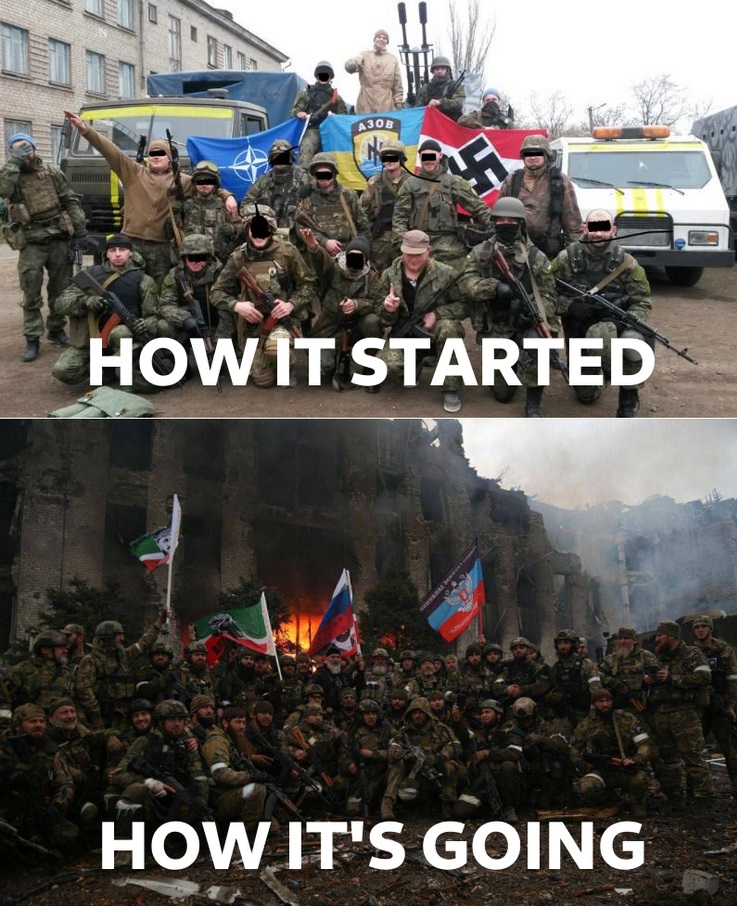
Here is a video of a Ukrainian nazi conference on the 5th of February 2022 (!) discussing the end goal of a dismembered Russia, which these nazis expected to gain a large share of the spoils from.


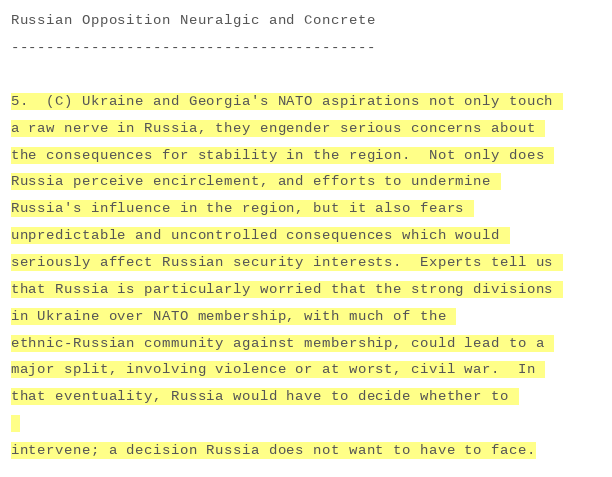


The Chinese Nationalists thought that military power should decide that they were in charge of China, right up until the People’s Liberation Army fucking bodied them and they fled to their little island with their tails between their legs (and then conducted massacres against the native population and anyone remotely leftist).
This “”“independence dispute”“” would have been resolved seventy years ago had the US Navy not stuck their fucking imperial beak in and stopped the communists chasing down these fascist war criminals and finishing the job.


Everything that exists takes its shape from a balance of opposing forces internal to its structure, and everything that exists is either coming into existence or fading from it.
For the first point, imagine a suspension bridge. The shape of the bridge is formed from the opposing forces of its wires pulling in opposite directions, but instead of cancelling out or one force winning over the other, the two opposed forces result in a synthesis - the structure of the bridge holding up against gravity.
For the second point, consider a mountain range. It is either rising up due to tectonic shifts or it is weathering away from wind, rain and frost. Either it’s rising up faster (as the Himalayas are today), or it’s weathering away faster (as most other places) - if the two rates happen to be exactly equal for a time then you have a moment of equilibrium, which are very rare in nature and only ever exist as a dynamic equilibrium. This is the complete opposite conclusion to the kind of ‘mechanistic’ materialism that underpins liberalism, where stasis and stillness are assumed to be the natural state of any system. With a dialectical understanding we can see that change is the natural state of a system, while equilibrium is fleeting and even the most seemingly ageless mountains will inevitably become dust in the wind, indeed are already becoming dust.
Consider also the suspension bridge again. While it’s being built, it’s coming into being, but the instant that construction is finished it begins to suffer the decay of entropy. It starts to rust and crumble away, and will fade out of existence unless it is actively maintained - unless energy is expended ‘bringing it into being’ once more and restoring the balance of the opposed forces that make it up. Otherwise, if one force begins to weaken (one side of the cables begin to rust) the forces may become so unbalanced that the structure disintegrates.
Now to combine these two points, think of fire. Fire is a particularly good illustration of a dialectical process, because it is a process that abolishes itself. Fire has to consume fuel to exist, in fact its existence is nothing but the consumption of fuel, but once it has consumed the fuel it disappears: its existence inevitably destroys the very conditions that allow it to exist. It spreads, rapidly bringing more and more of itself into existence, until all available fuel is being burned and it starts dwindling away. And this happens not because of “conscious will” (neither God reaching down to snuff it out, nor the fire ‘choosing’ to burn to ash), but because of its internal structure and the resolution of its internal contradictions.
Another such example would be yeast turning sugar into alcohol, inevitably poisoning itself to death… and a further example would be capitalist society creating the conditions for a socialist revolution. The capitalists cannot do away with the workers, their labor is the only thing that allows capital to be expanded. But competing in the market obliges the capitalists to drive their workers into such miserable conditions that they inevitably ask things like “Why is this happening to me? What has caused this situation? And how can I stop it?”
And in answering those questions, they are brought face-to-face with stark reality, they are driven by necessity to seek a true understanding of the world’s historical development. They are forced to learn how the currently existing society rose out of the previous social structure, which, due to its internal contradictions, caused its own abolishment - the workers with the greatest understanding discover dialectical materialism, and thus finally they are able to understand the process by which they were inevitably forced into discovering dialectical materialism. So the process of capitalist society’s development leads, inevitably, to the existence of the communist workers that will overthrow it.


Yeah, clearly they just post any kind of Russian propaganda over at the… checks notes Kyiv Independent


Why are you defending the rump state of a fascist dictatorship?



I hope the “Republic of China” can someday be peacefully dissolved and the province of Taipei reunited under the mainland government.


I question the US’s claims over a certain region (the whole of it)



They joined a civil war in progress on the morally correct side
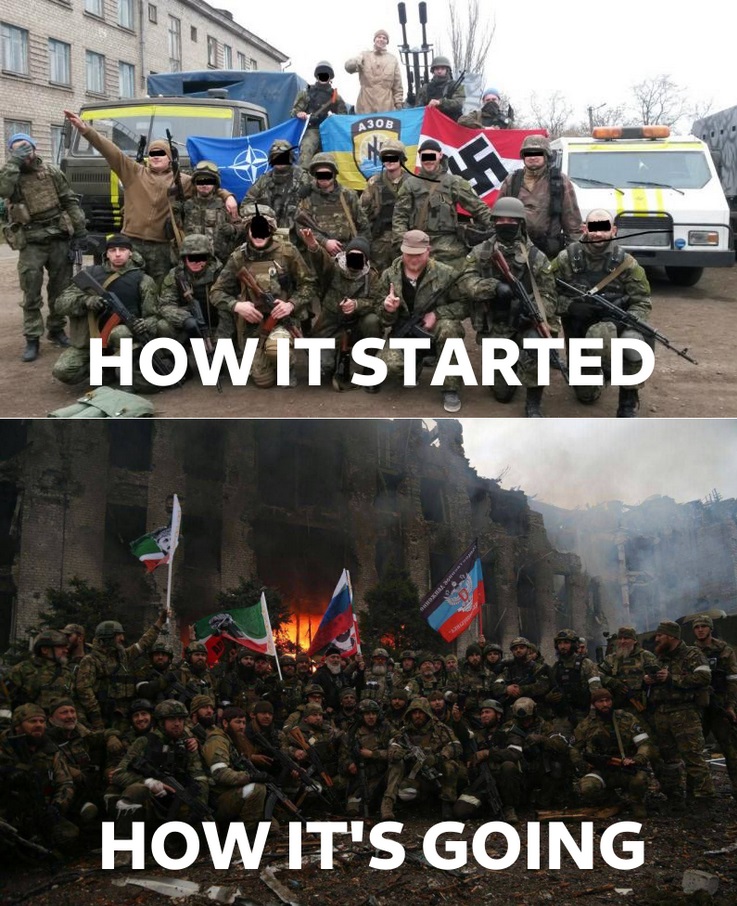


Oh man, what did the US and UK have that the USSR didn’t? That’s right, a giant fucking empire grinding hundreds of millions of third world slaves into the dirt.
And yet, even without that the USSR was growing so much faster it would have caught up to and surpassed them eventually - until they couped it, destroyed it and ravaged its people and economy.
Okay, so where’s your proof of this? Reports? Graphs? Photos?
Of course you don’t have any because you’re just asserting an absolutely, totally ridiculous narrative. The growth rate was frighteningly low?? It was the fastest rate of economic growth in human history! The people became poorer??? China is basically the only place in the world that lifted anyone out of poverty in the last thirty years! Without China, global poverty reduction is a net negative. 800 million people joined the middle class! These are not achievements you can have “in name only”. Like, you can’t fake the fact that China produced ONE BILLION TONS of steel last year, or that it installed four times as much green energy as the entire G7 combined. These facts require an enormous, highly advanced industrial base, which requires an enormous, highly skilled body of workers.
So what, exactly, is your personal experience of China that contradicts these provable facts then?


Would you say Ukraine was “preparing for a possibly (sic)” when its Nazi special forces were creating Hitlerjugend-style child soldier training camps?



Damn, if the Ukrainians had your tactical insight they might’ve won by now!
Yes. China is controlled by the Communist Party of China, who maintain an unbreakable grip on the commanding heights of the economy - energy, utilities, infrastructure, steel, finance etc. State-owned enterprises are some of the largest companies in the country, and hence also some of the largest in the world.
Foreign capitalists were invited to invest in China starting in the 80s, in order to bring in the technology and capital (tools, machines and money) that China was sorely lacking. This unfortunately led to several of the problems typical to capitalist economies - uneven development between the cities and countryside, increases in wealth inequality, the strengthening of the national capitalist class and the spread of liberal (pro-capitalist) ideas - but through the whole process, and unlike in the USSR, the CPC maintained total political control and didn’t allow the capitalists to dictate policy.
It’s true that China appeared to go quite far in a liberal direction, including by joining the WTO; around the turn of the millennium, the US and the rest of the capitalist world assumed that China would soon liberalize completely, both economically and politically, and they’d be able to break it open and feast on the insides like they did with the USSR. Instead, since then, and especially since the appointment of Xi Jinping as President, China has been moving, more or less rapidly but seemingly inexorably, towards more outright socialist policies. The result of the swing to the right and now back to the left is that China has had one of the longest and fastest sustained periods of economic development in human history.
China’s growth outperformed every other major economy by an absolutely unfathomable degree:
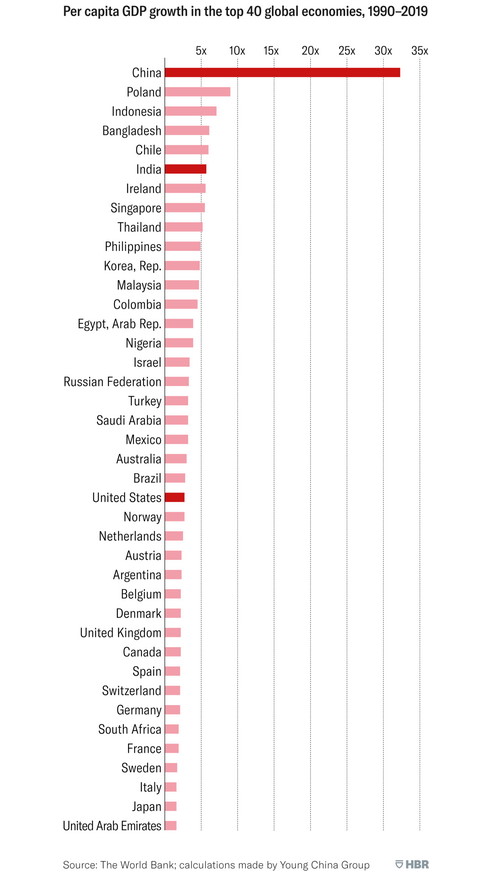
China, following a centrally-planned socialist development scheme, went from poorer than to richer than nearly all of Africa, which was trapped in extractive capitalist “development” hell by coercive IMF and World Bank loans and the austerity policies forced on them by the terms of these loans:
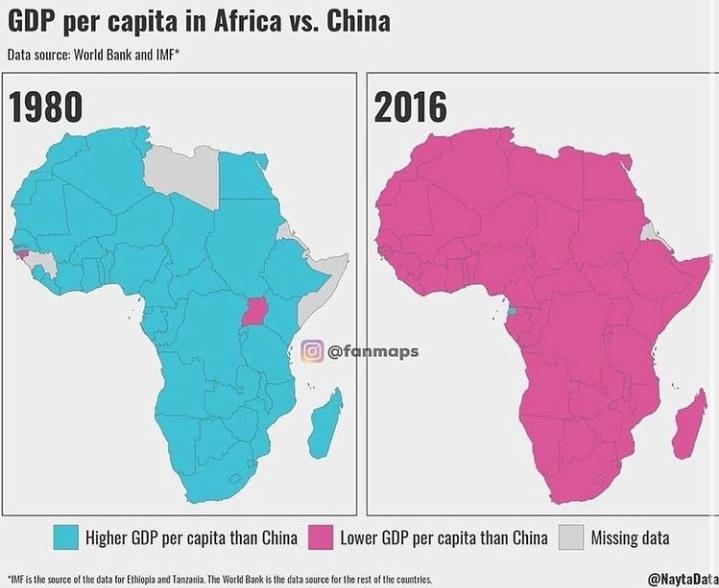
And China didn’t just create products for export, but materially improved the lives of its citizens to an enormous degree. This is just one example of the kinds of change that Chinese citizens saw in a single generation:
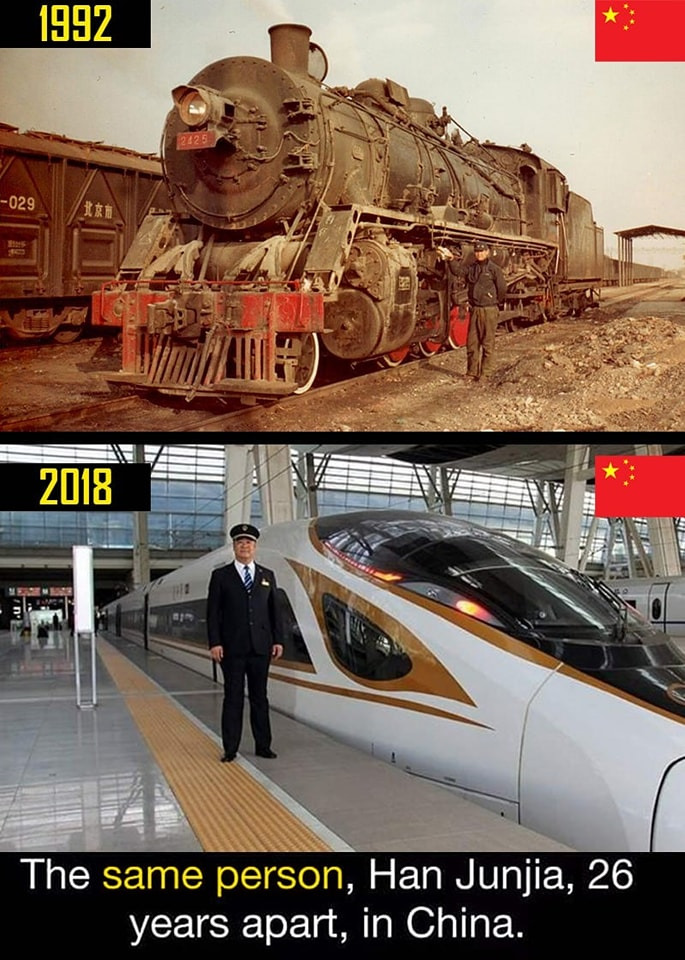
This is a really important image - China’s economy grew massively while its workers’ salaries also grew massively in the same period, going from the cheapest labor in South East Asia to the most expensive (but, thanks to development of technology, also by far the most productive):
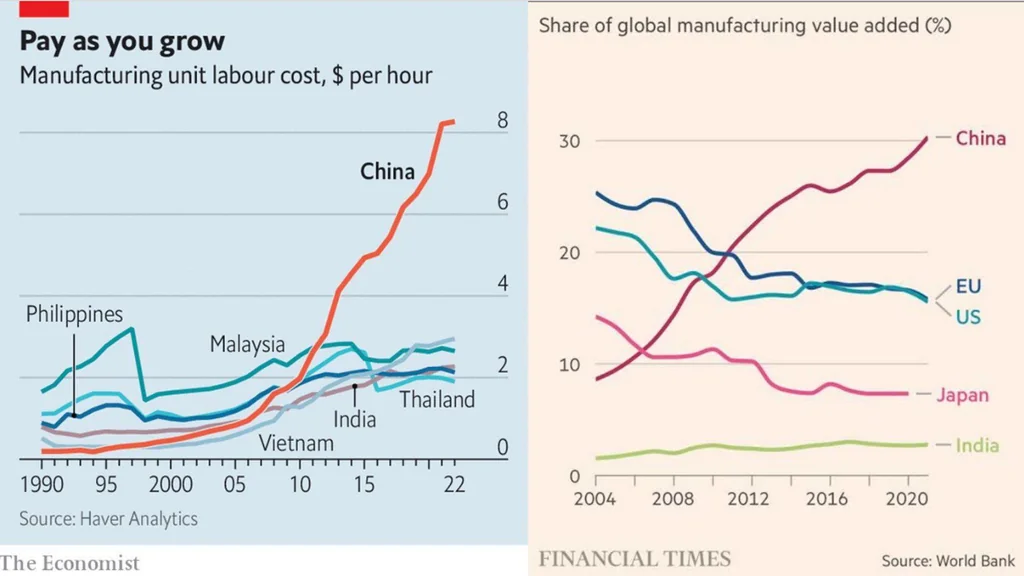
And here is China’s response to a growing bubble in the Chinese real estate market:

No capitalist country could ever even conceive of going against the wishes of the finance capitalists, who make huge fortunes off of real estate speculation even as it drives the economy into devastating recessions. But China was able to forcibly deflate the bubble, transferring investment from speculating on real estate into the further development of industry.
In short, no capitalist economy run by and for the capitalist class could ever have made these achievements. Only an ideologically committed and politically dominant communist party would be able to manage an economy this way, wielding the capitalists as tools to improve the productive forces and raise their people out of poverty while setting the stage for the transition to socialism.
Edit: here is a long essay, China Has Billionaires, on the same subject, which is well worth the read


 Mr. Boatarelli!
Mr. Boatarelli!

Their “determined to dominate”
Our “determined to ensure we lead the world”



Removed by mod


The “”“problem of overshoot”“” is that the human species is still in the death grip of capitalism. The task of preserving a habitable world is not being ignored because humanity is just too stupid to understand how to do it, but because it’s incredibly profitable for a tiny handful of extremely rich and powerful people to enforce the current course by any means necessary, including extreme violence - or indeed, funding academics to point the blame at anything but themselves. “It’s just human nature!”
I would respond to the problem of ‘over’ shoot by ‘exactly’ shooting the capitalists in their rotten hearts, with the help of an army of communist soldiers.